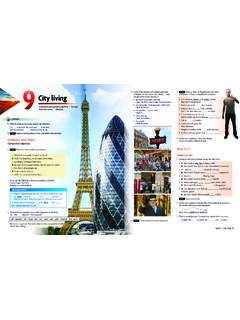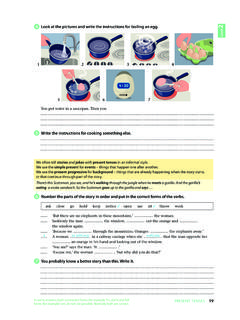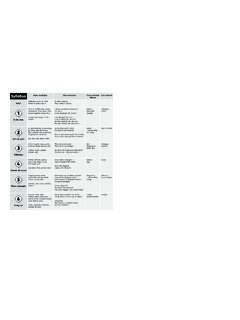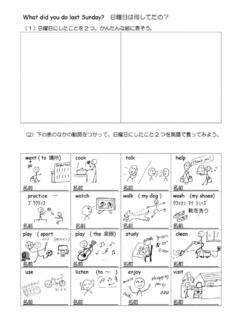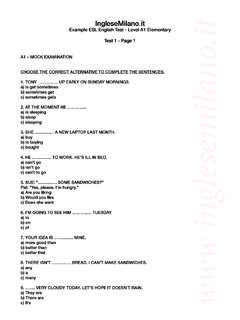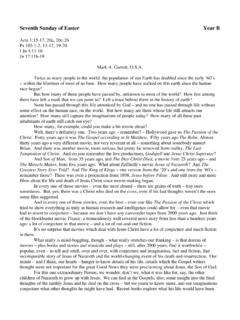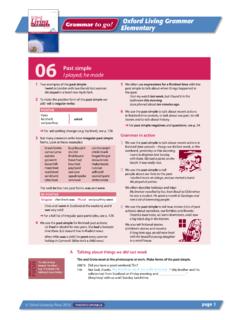Transcription of grammar summary - Oxford University Press España
1 In some answers, both contracted forms (for example I m, don t) and full forms (for example I am, do not) are possible. Normally both are tensessection 4 past tensesgrammar summarys i m p l e p a s t: I worked, she worked, he didn t work etc p a s t p r o g r e s s i v e (o r p a s t c o n t i n u o u s ): I was working, she was working, he wasn t working etcEnglish has two past tenses. We use the simple past for complete finished actions. We often use it in stories. I wrote ten letters yesterday. A man walked into a police station and asked.
2 We use the past progressive to talk about actions which were unfinished at a past time. What were you doing at last night? I was writing letters. 45 Past tEnsEs About 6,000 years ago, somebody painted this picture on a cave wall in Namibia, south-west Africa. About 1,200 years ago, Vikings from Scandinavia made this beautiful ship. Stonehenge, in southern England, is about 4,800 years old. Who built it? Nobody knows. About 2,200 years ago, Shi Huangdi completed the Great Wall of China. About 33,000 years ago, in the Stone Age, a man or a woman drew this owl on the wall of a cave in southern France.
3 We don t know anything about the artist, and we never will. We only know that somebody saw an owl, saw that it was beautiful, and recorded its beauty. (When Picasso first saw prehistoric cave art, he said We have learnt nothing. ) Before the Bronze Age or the Iron Age, before the glaciers covered Europe and went away again, before all of recorded history, an unknown person left a message for us: I saw this creature, and I thought it was beautiful . Thank you, Stone Age cave of chauvet-pont-d 4514/9/10 15:27:50 Past tEnsEs46level 1 Past tEnsEs46simple past: forms I worked.
4 I went. rEgular vErbs irrEgular vErbs + I/you/he/she/it/we/they worked I/you/he/she/it/we/they went ? did I/you/he/she/it/we/they work? did I/you/he/she/it/we/they go? - I/you/he/she/it/we/they did not work I/you/he/she/it/we/they did not go Contraction: didn tHOW TO MAKE REGULAR SIMPLE PAST FORMS most verbs: + -ed work worked help helped rain rained after -e: + -d hope hoped like liked 1 Write the simple walked arrive change cook hate live pass shave watch VERBS ENDING IN -Y vowel (a, e, o) + y -yed play played enjoy enjoyed consonant (d, l, r etc) + y -ied try tried reply replied 2 Write the simple study cry annoy carry hurry pray DOUBLING (stopped, planned etc) one vowel + one consonant double consonant + -ed stop stopped (noT stoped)
5 Plan planned two vowels: don t double seem seemed wait waited (noT waitted) two consonants: don t double want wanted (noT wantted) help helped only double in sTrEssEd syllables preFER preferred buT WONder wondered 3 Write the simple rain start rob slim jump shout slip fit turn VIsit reGRET deVElop GALlop OPen ANswer reFER With irregular verbs, you have to learn the simple past forms one by one (see page 299).
6 Go went see saw buy bought pay paid 4 Write as many of the simple past forms as you can. check them on page 299, and learn the ones that you don t begin break bring catch come drink eat fall feel forget get give hear hold keep know learn leave let make pay put read say shut sit speak stand take tell think write 4614/9/10 15:27.
7 50 Past tEnsEsIn some answers, both contracted forms (for example I m, don t) and full forms (for example I am, do not) are possible. Normally both are 1 Past tEnsEs47simple past: use I left school in often use the simple past to talk about when things left school in 1990. I didn t see Ann yesterday. What time did you arrive?We use the simple past, not the present perfect (have seen etc) with finished-time saw that film last week. (noT I have seen that film last week.) did you pay William on Sunday? (noT Have you paid William on Sunday?)
8 1 Put the beginnings and ends together, using the verbs in the forget learn like read speak stop0 Shakespeare died 1 I my girlfriend s2 That s a really good When we were children4 I didn t my piano teacher5 Where did you A birthday on Monday. B in 1616. 0C so I my lessons last week. D I it last year. E we always French at home. F to speak Spanish so well? Note the word order with started this job three years ago. (noT .. ago three years.) It happened a long time ago.
9 2 How long ago was your last birthday? Ten days ago? five weeks ago? Eight months ago? Write the answer, and complete the other My last birthday was 3 Last January 2 Last Tuesday was 4 My third birthday We often use the simple past for things that happened one after another, for example in parked his car, went into the station and bought a ticket. Then he had a cup of coffee and .. 3 grammar in a text. Put simple past verbs into the 6: come hear open say not see stand 7 10: give hold not read take 11 15: run say not speak turn writeHe 1 outside her door for a long time.
10 Then he 2 her footsteps inside the house. She 3 the door and 4 out. At first she 5 him, but then she 6 , Oh, hello, Harold. He 7 a paper out of his pocket and 8 it to her. She 9 it in one hand, but 10 it. Listen, he 11 .. She 12 I 13 you this letter because She 14 back into the house. He 15 and walked slowly down the street. 1990 yEsTErday noW PasT 9? 10? 11? 4714/9/10 15:27:50 Past tEnsEs48level 1simple past: negatives I did not work. I did not go. - I did not work you did not work he/she/it did not work we did not work they did not work Contraction: didn tWe make simple past negatives ( - ) with did not /didn t + infinitive (without to).




